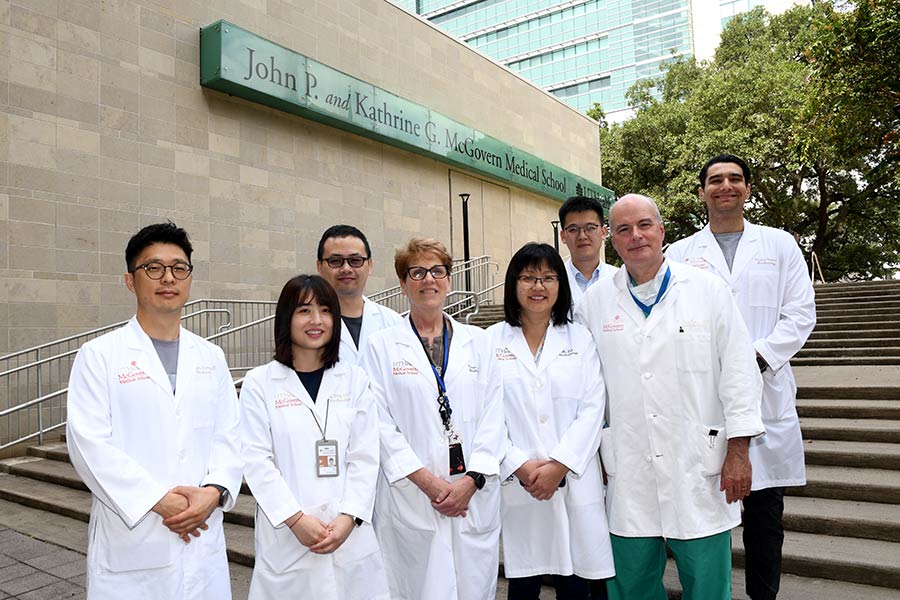Research focuses on liver protection, regeneration

With liver transplantation on the rise in the United States, McGovern Medical School scientists are focused on improving liver protection and regeneration. Recent back-to-back papers published in Science Translational Medicine, Journal of Hepatology and Hepatology by lead author Cynthia Ju, PhD, professor of anesthesiology, elucidate the mechanisms of eosinophil-mediated protection against acute liver injury and promotion of liver tissue repair.
“Eosinophils attenuate hepatic ischemia-reperfusion injury in mice through ST2-dependent IL-13 production” published in Science Translational Medicine uncovered that eosinophils are recruited into the allograft following orthotopic liver transplantation in humans, and the higher numbers of eosinophils correlate with lower degrees of liver injury. Using various genetically engineered mouse models, this study unveiled a previously unrecognized liver protective function of eosinophils.
“This was a serendipitous finding made possible owing to the collaboration with Dr. Steve Bynon and his surgical team,” said Ju, holder of the Joseph C. Gabel, MD, Chair in Anesthesiology.
“Hepatic recruitment of eosinophils and their protective function during acute liver injury” published in Journal of Hepatology highlights the eosinophil-macrophage cross-talk in promoting eosinophil recruitment to the injured liver.
“Eosinophils protect against acetaminophen-induced liver injury through cyclooxygenase-mediated IL-F/IL-13 production” published in Hepatology details the protective role of eosinophils against acetaminophen-induced liver injury, which is the most common cause of liver transplantation in the United States, responsible for 56,000 emergency department visits and 500 deaths per year.
“This series of studies suggest that strategies to promote eosinophil recruitment and/or adoptive transfer of eosinophils may be an effective cell-based therapy to improve outcomes of patients undergoing liver transplantation and patients with acute failure due to acetaminophen overdose or other conditions,” said Bynon, professor of organ transplantation.
This work has been supported by an NIDDK R01 grant (2019-2023), which was renewed in June this year. The renewal will focus on understanding the molecular and cellular mechanisms of liver repair and regeneration after injury. In this area, Ju’s lab recently published in Hepatology, showing the role interleukin-33 plays in promoting liver cell proliferation after partial hepatectomy, “Interleukin-33 facilitates liver regeneration through serotonin-involved gut-liver axis.”
Due to the regenerative capacity of the liver, partial hepatectomy has been an important therapeutic treatment for liver diseases, especially liver cancers. Post-hepatectomy liver failure cause approximately 10 percent mortality rate in patients with liver cancer. Insufficient liver regeneration in patients with partial hepatectomy often leads to post-hepatectomy liver failure. Identifying therapeutic targets to enhance liver regenerative capacity remains urgent, according to the paper’s authors.
“Our findings suggest that supplementation of interleukin-33 might be a promising strategy to reduce the risk of post-hepatectomy liver failure and small-for-size syndrome,” Ju said.
Ju leads a team of young scientists pursuing projects in acute and chronic liver diseases. These recent publications were contributed by Yaochun Wang, Long Xu, Yang Yang, Yankai Wen, Jong-Min Jeong, Constance Atkins, and Nicolas Moreno. These studies were supported by extensive collaborations with scientists and clinicians within the McGovern Medical School, including Bynon; Holger Eltzschig, MD, PhD; and Kangho Kim, PhD. Many scientists outside of the Medical School also have contributed to the studies, including Drs. Elizabeth Jacobsen (Mayo Clinic Arizona), William Lee (University of Texas Southwestern Medical Center), Bin Gao (National Institute of Health), and Chuan Wu (National Institutes of Health).